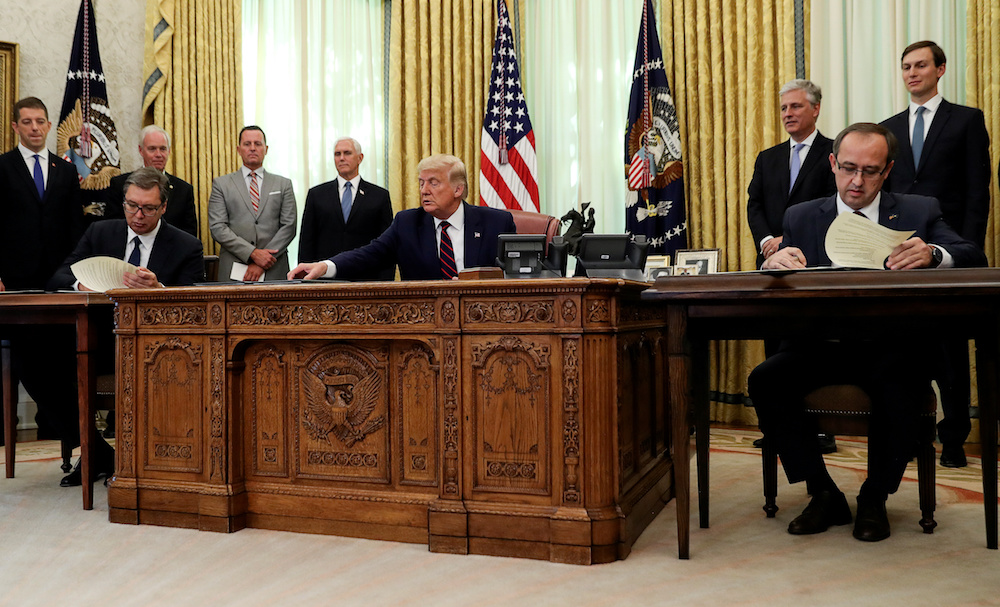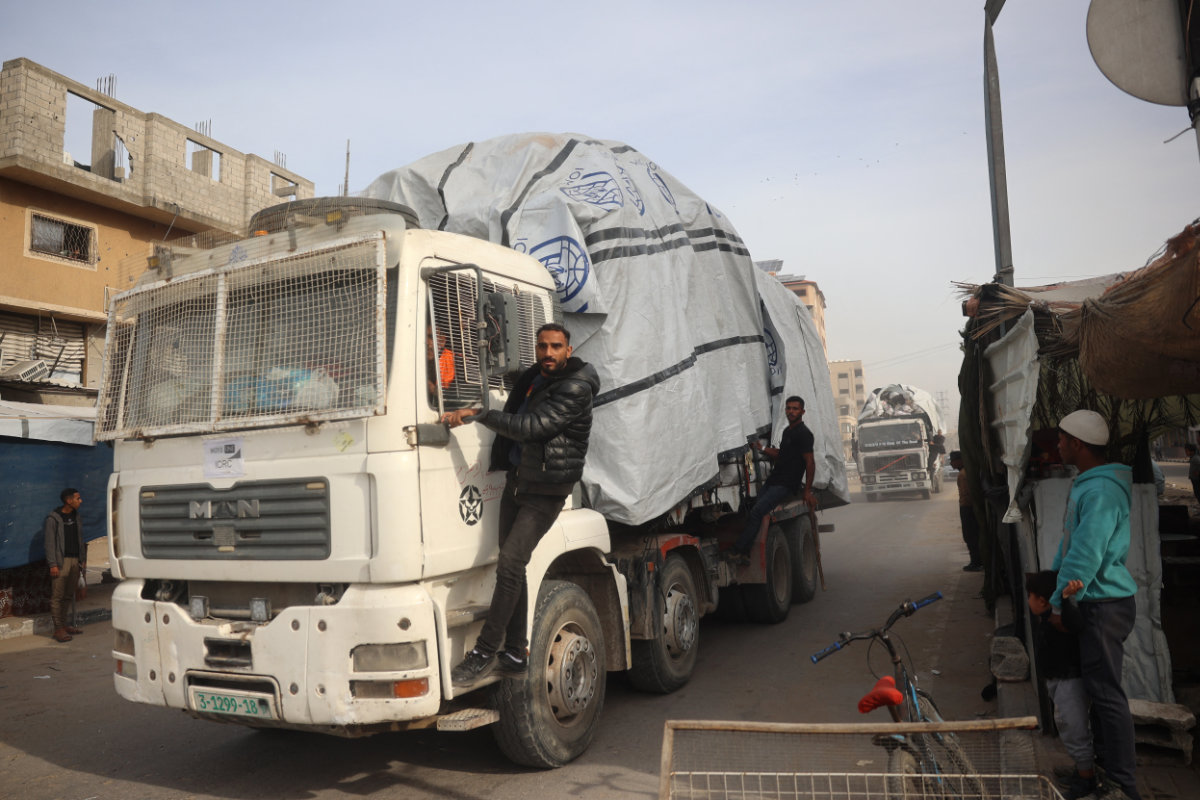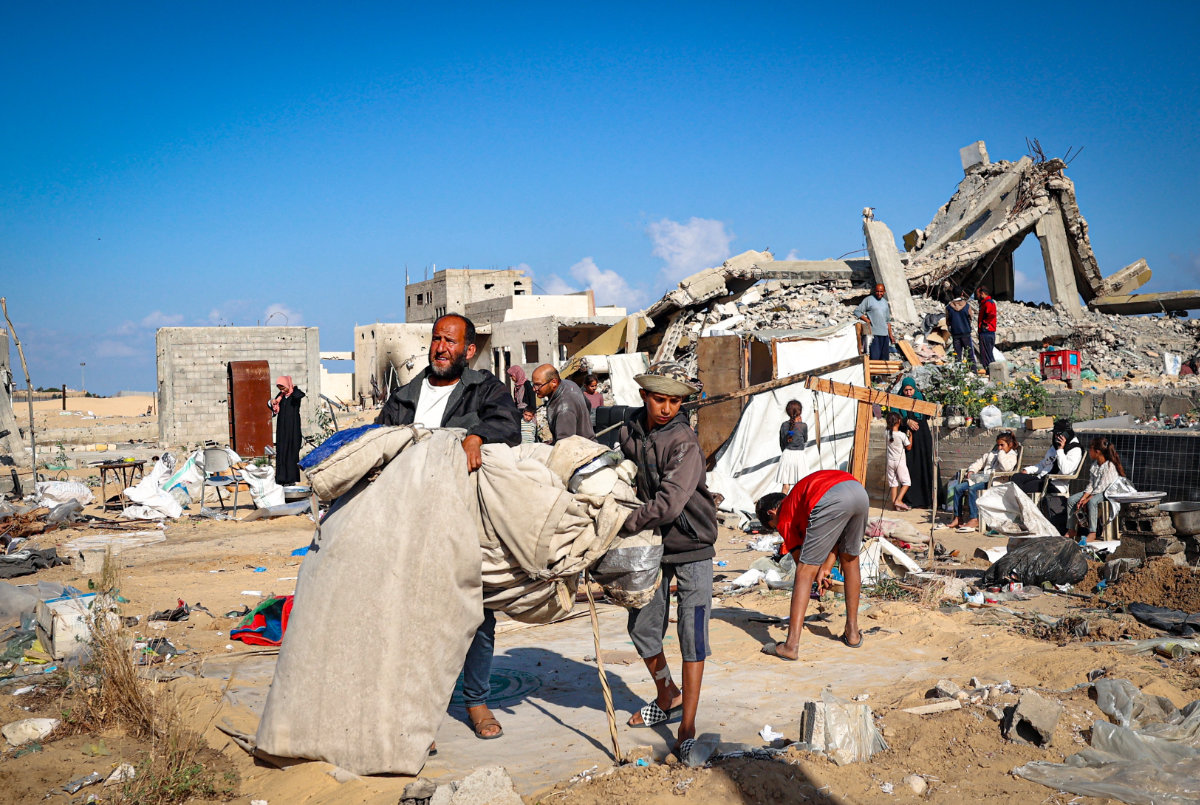BRUSSELS: The European Union warned Serbia and Kosovo on Monday that they could undermine their EU membership hopes by moving their Israeli embassies to Jerusalem, as US President Donald Trump’s surprise announcement about the change left officials in Belgrade and Pristina scrambling to limit the political fallout.
In an unexpected move last week, Trump said that Serbia and Kosovo had agreed to normalize economic ties as part of US-brokered talks that include Belgrade moving its embassy to Jerusalem, and mutual recognition between Israel and Kosovo.
It surprised the Europeans, who are leading complex talks between Serbia and its former territory of Kosovo on improving their long-strained relations, while Serbian officials appeared to be watering down their commitment to Trump, and Kosovo sought to allay concerns among Muslim countries.
The EU voiced “serious concern and regret” over both countries’ commitment to move their embassies to Jerusalem, saying the bloc is still committed to the “two state solution” in which Jerusalem will be the capital of both Israel and a future Palestinian state, and its own diplomatic mission is in Tel Aviv.
The 27-nation EU’s long-held policy is that Jerusalem’s status should be worked out between Israel and the Palestinians as part of broader peace negotiations, and that Serbia — as a candidate to join the bloc — should respect that.
“There is no EU member state with an embassy in Jerusalem,” European Commission spokesman Peter Stano said. “Any diplomatic steps that could call into question the EU’s common position on Jerusalem are a matter of serious concern and regret.”
The bloc expects prospective members like Serbia to align with its foreign policy positions.
“In this context any diplomatic steps that could call into question the EU’s common position on Jerusalem are a matter of serious concern and regret,” EU foreign affairs spokesman Peter Stano told reporters in Brussels.
Praising what he said was “a major breakthrough” and “a truly historic commitment,” Trump — deep into campaigning ahead of November’s presidential election — announced Friday that “Serbia and Kosovo have each committed to economic normalization.”

US President Donald Trump hosts a signing ceremony with Serbia’s President Aleksandar Vucic and Kosovo’s Prime Minister Avdullah Hoti at the White House in Washington, US, Sept. 4, 2020. (Reuters)
Trump also said that Serbia has committed to open a commercial office in Jerusalem this month and move its embassy there in July. The Trump administration recognized Jerusalem as Israel’s capital in late 2017, breaking with longstanding diplomatic practice, and moved the US embassy there in May 2018.
Israel Prime Minister Benjamin Netanyahu thanked Serbia’s president and confirmed that Israel and Kosovo, a predominantly Muslim country, will establish diplomatic relations. He said Pristina also will open its embassy in Jerusalem.
Stano, speaking as Serbian President Aleksander Vucic and Kosovo Prime Minster Avdullah Hoti held a new round of talks in Brussels on normalizing their relations, said the EU was told in advance only about the economic aspects of the White House event, not about movements in Jerusalem.
In Belgrade, Serbian officials appeared to be stepping back from the embassy pledge, with Foreign Minister Ivica Dacic saying the final decision will still have to be discussed by the government and will depend on “a number of factors” including future development of ties with Israel.
Asked about the move following the meeting in Brussels, Vucic said that “Serbia has not opened that chapter yet, but we are doing our best to align with EU declarations, EU resolutions as much as it is possible. But he underlined that Serbia ”will take care of our own interests for the benefit and for the sake of our people.”
Kosovo’s President Hashim Thaci, meanwhile, was on the phone with Turkish President Recep Tayyip Erdogan, trying to assuage fears about the decision to recognize Israel expressed by Turkey and the Arab League group of countries.
“Such a recognition will not violate under any circumstances the strategic, friendly and fraternal partnership with Turkey,” Thaci said after the conversation.
Israeli Prime Minister Benjamin Netanyahu welcomed the deal that establishes diplomatic relations with Kosovo, and would have both Kosovo and Serbia open embassies in Jerusalem. They would join the US and Guatemala as the only countries with embassies in the contested city, whose eastern sector is claimed by the Palestinians as the capital of a future state.
“We will continue efforts so that additional European countries will transfer their embassies to Jerusalem,” Netanyahu said Friday. He noted that Kosovo becomes the first Muslim-majority country to open an embassy in Jerusalem.
On Monday, Sharren Haskel, a lawmaker in Netanyahu’s Likud party and chairwoman of the Knesset’s Foreign Affairs subcommittee, said that the “EU efforts to educate Serbia and Kosovo are shocking.” She called on “other countries to strengthen Kosovo and Serbia, to join and move their missions to Jerusalem, the eternal capital of the Jewish people.”
Kosovo unilaterally declared independence from Serbia in 2008, around a decade after Belgrade sent troops into its former territory to crush an uprising by ethnic Albanian separatists. Serbia refuses to recognize Kosovo’s statehood, and tensions have simmered ever since.
The EU-facilitated negotiations, which the Europeans say is the only way to address their membership hopes, started in March 2011 and have produced more than a dozen agreements, but most of them have not been observed.
The talks stalled in November 2018 and only resumed in July after a parallel US negotiating effort began.
But as they met again on Monday, Vucic and Hoti recommitted to the European track, saying “that they attach the highest priority to EU integration and to continuing the work on the EU-facilitated Belgrade-Pristina Dialogue.”
In what was described as a “joint statement” issued by the office of EU foreign policy chief Josep Borrell, Vucic and Hoti also said they “committed to redoubling their efforts to ensure further EU alignment in accordance with their respective obligations.”
They appeared to play down Friday’s announcement, by saying that “the recently agreed documents in Washington, D.C., building on previous Dialogue-related commitments undertaken by the two parties, could provide a useful contribution to reaching a comprehensive, legally binding agreement on normalization of relations.”
In one of Europe’s most intractable disputes, Serbia has refused to recognize Kosovo’s declaration of independence since the province broke away in a 1998-99 war that was ended only by a NATO bombing campaign against Serb troops.
Both Kosovo and Serbia are facing mounting pressure from the West to resolve the impasse, seen as crucial to either side joining the EU.
More than 13,000 people died in the war, mostly Kosovo Albanians, who form a majority in the former province.
One key question is diplomatic recognition for Kosovo — five of the EU’s 27 countries do not acknowledge its independence.
The EU’s special representative for the dialogue, Miroslav Lajcak, hailed “full progress” in Monday’s talks on economic cooperation and the issue of people left missing or displaced by the conflict.
“Our negotiations today were intense as usual and not always easy, but what prevailed was the will of both sides to advance the discussions despite the painful and complex issues at hand,” Lajcak said.
Hoti also said advances had been made in Monday’s talks.
“I am pleased to say that progress has been made in drafting the final agreement between the two countries for the full normalization of relations,” he told reporters.
Talks will continue next week at expert level, Lajcak said, with the two leaders due to meet again later in September.
The two sides have been in EU-led talks for a decade but little progress has been made.
A raft of agreements in 2013 have yet to be fully implemented and a previous round of negotiations broke down in 2018 after a series of diplomatic tit-for-tats.
Vucic and Hoti resumed face-to-face talks in Brussels in July but the effort got off to a frosty start, with the Serbian leader accusing Pristina of trying to blackmail Belgrade.
Monday’s talks also broached the question of the ethnic Serb minority in Kosovo and their future status in the country — one of the thorniest disputes between the two sides.
Washington touted the agreements signed by Vucic and Hoti at the White House on Friday as a major breakthrough, but on Monday the two leaders issued a more cautious joint statement before they met.
(With AP and AFP)
































